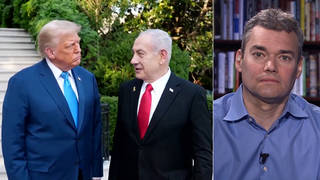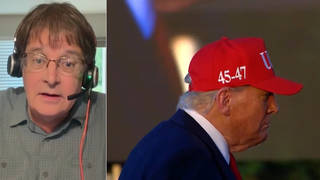
President Obama spoke last night hours after a watchdog group filed a lawsuit seeking records of visits by top healthcare executives to the White House. Citizens for Responsibility and Ethics in Washington says the public has a right to learn the extent that these executives are influencing the Obama administration’s healthcare policy. We speak to the group’s executive director, Melanie Sloan. [includes rush transcript]
Transcript
JUAN GONZALEZ: The President spoke last night hours after a watchdog group in Washington filed a lawsuit against the Department of Homeland Security over the Secret Service’s refusal to hand over records of visits by top healthcare executives to the White House. The watchdog group Citizens for Responsibility and Ethics in Washington argued the public has a right to learn the extent that these healthcare executives are influencing the Obama administration’s healthcare policy. The same group filed a similar lawsuit last month seeking records of coal executives visiting the White House. President Obama was asked about the issue last night.
CHRISTI PARSONS: During the campaign, you promised that healthcare negotiations would take place on C-SPAN. And that hasn’t happened. And your administration recently turned down a request from a watchdog group seeking a list of healthcare executives who have visited the White House to talk about healthcare reform. Also, the TARP inspector general recently said that your White House is withholding too much information on the bank bailouts. So my question for you is, are you fulfilling your promise of transparency in the White House?
PRESIDENT BARACK OBAMA: Well, on the list of healthcare executives who’ve visited us, most of the time you guys have been in there taking pictures, so it hasn’t been a secret. And my understanding is, we just sent a letter out providing a full list of all the executives. But frankly, these have mostly been at least photo sprays, where you could see who was participating.
With respect to all the negotiations not being on C-SPAN, you will recall, in this very room, that our kickoff event was here, on C- SPAN. And at a certain point, you know, you start getting into all kinds of different meetings. Senate Finance is having a meeting. The House is having a meeting. If they want those to be on C-SPAN, then I would welcome it. I don’t think there are a lot of secrets going on in there.
And the last question, with respect to TARP, I — let me take a look at what exactly they say we have not provided. I think that we’ve provided much greater transparency than existed prior to our administration coming in.
AMY GOODMAN: President Obama in his fourth news conference at the White House since he’s taken office.
Well, Melanie Sloan joins us now from Washington, DC, the executive director of Citizens for Responsibility and Ethics in Washington. Her organization sued the Department of Homeland Security on Wednesday after the Secret Service refused to hand over records of visits by top healthcare executives to the White House. Hours after the suit was filed, the White House released a list that showed twenty-seven top healthcare executives have visited the White House since February, but the Obama administration has so far ignored other parts of the group’s Freedom of Information request.
Melanie Sloan, welcome to Democracy Now! Explain exactly what you’re demanding and your response to what President Obama said last night.
MELANIE SLOAN: Well, we had sent a Freedom of Information Act request in June, asking for information about eighteen executives’ visits to the White House. The White House had declined to respond to that Freedom of Information Act request, or FOIA. So we, yesterday, sued them, and we, in fact, filed for a preliminary injunction, asking a judge to order that the White House deliver that information to us quite promptly. Then, late last night, right before the President’s news conference, the President — the White House released a letter naming some of the executives in our letter and listing when they had in fact visited the White House.
AMY GOODMAN: I want to just talk about some of the names, as they’ve released this, naming some of the healthcare executives who have made multiple trips to the Obama White House.
Richard Umbdenstock, the president of the American Hospital Association, has visited the White House eight times since Obama took office, beginning on February 3rd, two weeks after Obama’s inauguration.
Former Congressman Billy Tauzin has visited five times, now head of the drug industry lobby, the Pharmaceutical Research and Manufacturers of America, known as PhRMA.
Dr. James Rohack, president-elect of the American Medical Association, has visited four times, as has Karen Ignagni, president and CEO of America’s Health Insurance Plans, an industry trade group.
Other healthcare executives who have made multiple visits to the Obama White House include Jeffrey Kindler, CEO of drugmaker Pfizer; Stephen Hemsley, chief executive of UnitedHealth Group; George Halvorson, head of Kaiser Foundation Health Plan; Richard Clark, CEO of the Merck pharmaceutical company; Jay Gellert, CEO of Health Net; and Rick Smith, senior vice president of PhRMA, which Billy Tauzin heads.
What’s the significance of this, Melanie Sloan?
MELANIE SLOAN: Well, the significance is that major healthcare reform is being debated. It’s going to change our healthcare system in the most colossal way that any of us have ever seen. And here it is, there are lots of industry executives who are at the table. And we should know — we, as Americans, have a right to know — who is at the table influencing decision makers who are going to make big decisions about our healthcare.
JUAN GONZALEZ: And Melanie Sloan, were there any parts of your request that were not granted?
MELANIE SLOAN: Well, this, in fact, is not a response to our request, in our mind. This is a two-page letter that the White House sent over last night. But in fact what we asked for are the records, the records that the Secret Service maintains regarding these visits. This is — this information is not nearly complete. We’re allowed to see the records themselves, which will also indicate who from the White House requested that the person — that the visitor be admitted, perhaps who they were meeting with, and sometimes even the purpose of the meeting. So there’s a great deal more information that can be gleaned from the records themselves. Also, we don’t actually know if this is a complete search or not. The White House’s letter doesn’t indicate that this is complete in any way.
Finally, the White House says that this is a — they’ve released this as a matter of discretion. Well, in fact, several courts have already held — judges have held in three cases that these records are subject to the Freedom of Information Act request, and they are not just a matter of the President’s discretion to release them. They have to be required — by law they’re required to release them.
JUAN GONZALEZ: Well, didn’t the President actually make a big issue of this during his campaign, actually saying — I think it was on his website even, his campaign website — that the White House is the people’s house and the people have a right to know who visits?
MELANIE SLOAN: Yes, he did. And, in fact, transparency has been sort of a totem of this administration, at least that’s what they claimed. But then we’re finding the actual transparency is a little disappointing.
And, of course, they’re release these names last night, because they want to avoid the distraction at the President’s press conference on healthcare.
But we have another Freedom of Information Act request and a lawsuit outstanding for the information regarding coal executives’ visits to the White House. And the White House has not responded to that.
Also, there is another case — two cases that we have before the Court of Appeals regarding Secret Service visitor records. These cases were started under the Bush administration for visits by Christian conservative leaders to the White House and also by a lobbyist named Stephen Payne. Courts previously held that the Secret Service had to provide that information. That case is going up on appeal, and so far the Obama administration is taking the exact same position that the Bush administration took, claming these records are presidential records, not federal records, and therefore not subject to the Freedom of Information Act.
JUAN GONZALEZ: And Melanie Sloan, did you — was your request limited only to industry executives? For instance, I know that there are many — several labor unions that have been visiting the White House on this issue. And also to — it would have been interesting to see to what degree citizen groups or advocacy groups had also been invited, to have a comparison vis-à-vis the industry folks.
MELANIE SLOAN: Well, the way that you request visitor records is you have to have the names of people. You can’t just say, did a particular — “Did Citizens United come? Did SEIU come?” You need to have the name of the person you want them to seek for. So we picked a list of eighteen industry executives, trying to take from a variety of different places in the healthcare system, and this is what we got. Somebody else could of course submit a Freedom of Information Act request asking specifically, you know, how many times has Andy Stern, the president of SEIU, been to the White House, and other people like that.
AMY GOODMAN: Melanie Sloan, the issue of the interview the FBI did with Vice President Dick Cheney, that you have requested, around the exposing of the CIA operative Valerie Plame — you’ve demanded this, and the Obama administration is not handing it over now?
MELANIE SLOAN: Yes. This is a case that’s been going through the courts for quite some time. We had asked for it under the Bush administration. And then, when the administration changed, we thought perhaps the new Justice Department would give over the notes of the interview, the transcript of the interview. But, in fact, the Justice Department lawyer said in front of Judge Emmet Sullivan, “Well, just because the administration changes doesn’t mean the Department of Justice’s position changes.”
And then they tried to argue for a Daily Show exception, saying if you’re going to give over information that’s going to be used to embarrass politicians on The Daily Show, that shouldn’t be handed over.
In addition, Lanny Breuer, the Assistant Attorney General for the Criminal Division, has argued in a declaration that the Cheney interview shouldn’t be handed over, because handing that over will provide a chilling effect, meaning that future top White House officials won’t cooperate with criminal investigations if they can’t be guaranteed confidentiality, which you have to think is a pretty outrageous statement, that the top law enforcement officials in the country would not abide by and cooperate with a criminal investigation. Because they might be embarrassed?
AMY GOODMAN: And Melanie Sloan, the records relating to who comes in around the issue of financial regulation, who’s coming to the White House?
MELANIE SLOAN: You know, the White House is refusing to provide any kind of Secret Service visitor record. So, they say that they’re reconsidering their policy now, and perhaps they are. We won’t be satisfied if the White House takes the position that they’ll just release these records on a discretionary basis, because that means some days they can release them, and some days they can not. So anytime they think it would be embarrassing to admit that a certain person visited the White House, they won’t tell us.
The fact of the matter is, there’s a law called the Freedom of Information Act that entitles citizens to know what our government is up to, and that includes knowing who’s visiting the White House and who’s influencing the administration when they’re making decisions that affect all Americans.
JUAN GONZALEZ: And beyond the White House visitor logs, how would you generally assess the Obama administration in its first six months in terms of the issue of transparency in government?
MELANIE SLOAN: Well, I think they’ve been disappointing. Obviously, they held themselves out to a very high standard with the promises of transparency, both on the campaign trail and then in the first days in office. And so, when you hold yourself out as the government that’s going to be the most transparent, people are really looking to you to meet that standard.
And now we’ve found, not just with the Secret Service visitor records, but also with the issue of the Cheney transcript, we have had trouble also obtaining from the White House documents related to the missing tens of — over ten million missing White House emails that we had discovered under the Bush administration. There’s obviously the issue of the pictures from Guantanamo Bay. So there’s been several different issues where the White House has not been nearly as transparent as they promised, and I think they really need to do a better job.
AMY GOODMAN: Melanie, you just said he’s not as good as what he promised. How does Obama compare to Bush in this?
MELANIE SLOAN: Well, really there’s no comparison, because Bush was probably the most secretive president on record in recent time. But the difference is that the Bush administration made no bones about that — they said they were secretive — and Obama came in promising us transparency. So, we just want him to meet the promises — to deliver on those promises.
AMY GOODMAN: Well, Melanie Sloan, I want to thank you very much for being with us, executive director of Citizens for Responsibility and Ethics in Washington.













Media Options